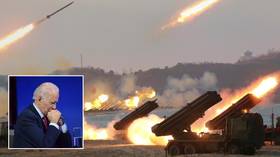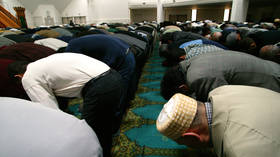Kim Jong-un’s growing nuclear wish-list for North Korea spells trouble for Joe Biden

Pyongyang has spelled out its desire for long-range nuclear missiles and a nuclear submarine. It's part of a strategy to force the US into accepting a nuclear North Korea, and there will be no easy solutions for the new president.
Four years ago this month, one of the earliest tweets of Donald Trump’s presidency from his now culled Twitter account stated, “North Korea just stated it is in the final stages of developing a nuclear weapon capable of reaching parts of the US. It won’t happen!” Famous last words, as they say.
As the administration prepares to leave office, we now know that, by hook or by crook, North Korea ultimately did not denuclearize during Trump’s time in the White House. Despite some optimistic moments of diplomacy, which included summits in Hanoi, Singapore and Panmunjom, the US and North Korea were never able to meet halfway and, thus unabated by pressure from Washington, Kim Jong-un continued his nuclear programme.
Also on rt.com Kim Jong-un’s massive new ballistic missile is final proof that Trump’s confused approach to North Korea has failedNow, to add insult to injury, the supreme leader is presiding over a conference of the Workers’ Party of Korea where he is doubling down on the country’s nuclear goals. The timing is not a coincidence. Kim branded the US North Korea’s “biggest enemy” last week, stated the American position will never change irrespective of who is president, and vowed to continue nuclear development, setting out an elaborate wish-list that seeks to establish a nuclear-capable submarine and tactical nuclear missiles. The BBC coined the moves as “laying down the gauntlet” to Joe Biden.
The move is an obvious negotiating gambit. The goal is to secure a deal which offers sanctions relief for North Korea, but nonetheless on favourable terms that allow it to keep its nuclear capabilities, which are not up for discussion.
Kim was on the brink of sealing such a deal with Trump in Hanoi, only for the president to scuttle it in the last moment and shift back to a demand of complete denuclearization, which is a non-starter for Pyongyang.
Now, Kim wants to draw Biden to the table. And he will do so by provocation. Should the incoming administration stick to absolutist demands, it will discover quickly – as Trump did – that North Korea will simply advance its capabilities further and further, making the eventual outcome even more unfavourable.
North Korea has built its nuclear programme upon a strategy of state survival, irrespective of the penalties that it may bring in terms of sanctions. As a small and impoverished nation facing up to a gigantic superpower in the US – and a conventionally superior South Korea – its nuclear weapons have long been a must-have in order to negotiate on preferential terms and to maintain its independence.
The country’s Juche ideology teaches that North Korea must be independent and sovereign at all costs, and that it must engage in struggle against fate in order to carve out its own destiny and evade domination by larger powers, a strategy formulated in facing off against the US.
Given all this, it is not surprising that it considers the existence of its nuclear programme to be non-negotiable. Decisions taken by America in the last 20 years, which have seen regime changes in Iraq and Libya, have only fortified that position. For North Korea to voluntarily denuclearize altogether and trust the US in exchange for sanctions relief would be stupid and naïve. Look, for example, at Iran, which complied with US demands over its nuclear programme and then had sanctions slapped back on it regardless.
Also on rt.com North Korea flashpoint could be on the cards for US under BidenThus, the existence of such weaponry allows North Korea to have a leverage in negotiations it would otherwise not have. It is willing to trade away parts of it, it is willing to slow down or cap its development, but it is not willing to cede it completely. Similarly, the greater capability it attains towards the US, the less it will give away.
The Trump administration made a mistake in believing that it could pressure North Korea so hard, with sanctions and threats of military action, into scrapping its entire nuclear programme. Kim Jong-un was willing to compromise with the US in order to quell Trump’s aggressive posture, but not capitulate.
Following the premature ending of the Hanoi summit in 2019, Kim began to immediately push for enhanced capabilities, going on to test 19 short-range missiles that year. 2020 proved quiet, but it appears Pyongyang had decided to bide its time and wait for a new administration, seeing no more benefit in dealing with Trump. Now, however as Joe Biden prepares to take office, all cards are back out on the table.
Kim wants to give Biden an early test, both literally and figuratively. He wants to be able to push for a deal on his terms, and his strategy is to continue to advance North Korea’s capabilities until he gets it, as evidenced by the wish-list.
Kim has been open about his goal, stating during the conference that “the strong defence capability of the state never precludes diplomacy but serves as a powerful means to propel it along the right course and guarantee its success.” The intention is not to irrationally attack anyone, but to secure outcomes which are favourable to Pyongyang.
As a result, Biden faces difficult policy decisions at the start of his presidency. Should he flip back to the Obama administration position of refusing to deal with North Korea or demand complete denuclearization, Kim will respond with provocations and aim to bolster his hand.
Similarly, if Biden becomes confrontational, Kim will respond in tandem. And so, there are no easy choices. Before the US turned on China, Trump looked to it for cooperation on North Korea. That is now much harder to pull off, as Beijing will demand concessions to work on the issue. It would appear, then, that there’s trouble afoot, and it would be no surprise if Kim returns to a path of missile-testing in order to draw in the new administration. Buckle up.
Like this story? Share it with a friend!
The statements, views and opinions expressed in this column are solely those of the author and do not necessarily represent those of RT.















